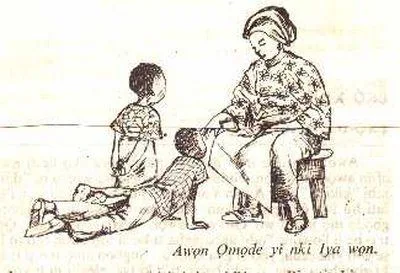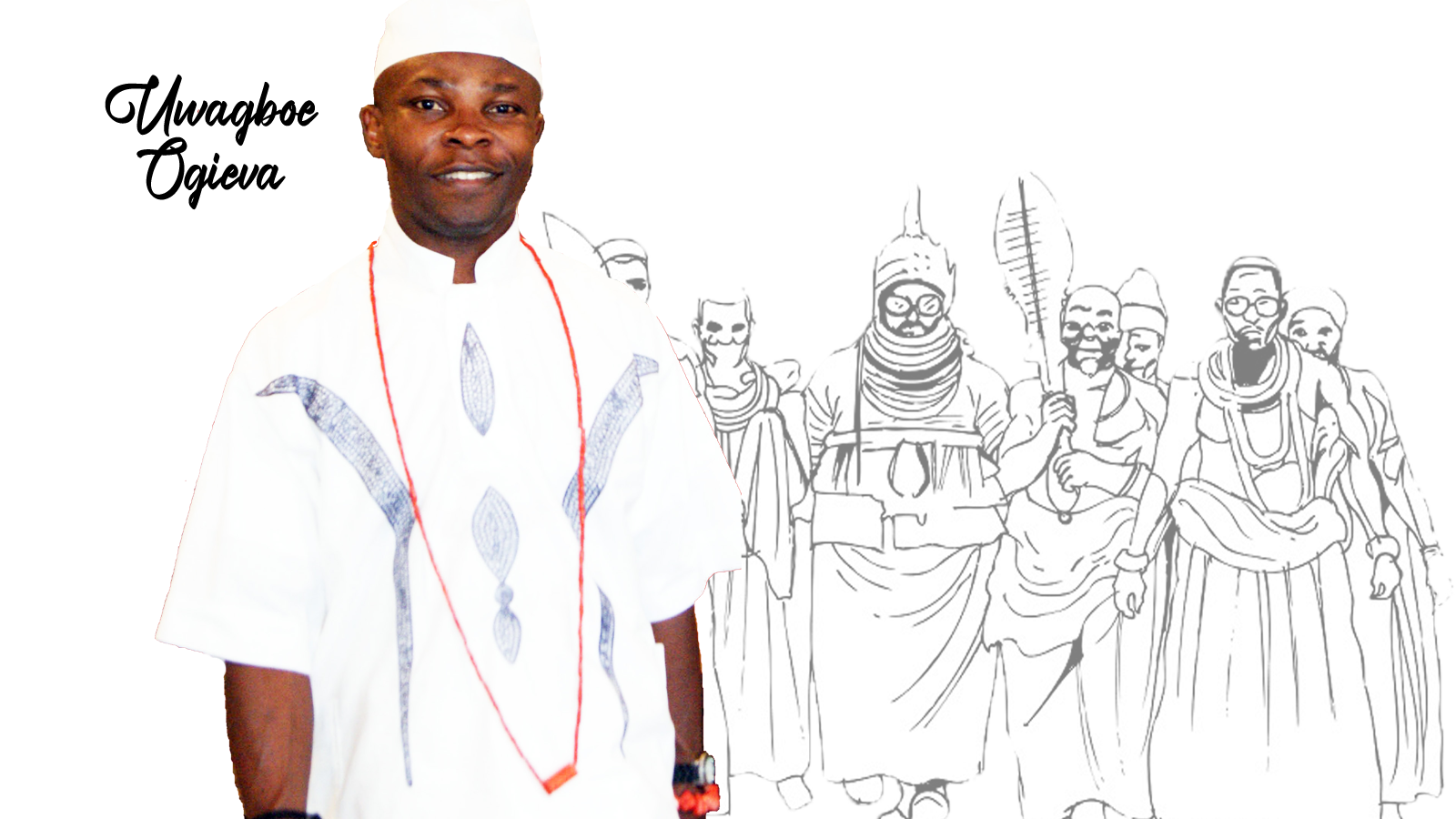OTUẸ
OTUẸ
Ọten
nọghan
O
T
U
Ẹ
-
Ẹ
D
O
OTUẸ OKARO
Otuẹ okaro ore otue na tue vbe a gha mien omwan rra a gha mien enowaen vbe owie, avan, ota rra keghekeghe hia. Ivbiẹdo mwen otue ukhu ughughan ne iran tue owiowie. Usu avbe otue ukhu ne ivbiedo tue vbe owie ore , latose, labo, lavbeze, lagiesan, lani, lamogun keveb nibun.
Enokoto ona otue Ivie (ne ovbokhan) kevbe Ogieva (ne enowaen):-
Otue Ivie kevbe enowaen Ogieva
| Ivie:Domo (Sa), (Iyenogie)Lamogun |
| Ogieva:koyo |
| Ogieva: Vboyehe? |
| Ivie:Oyese |
| Ogieva:Vba tie we? |
| Ivie:Eni mwen Ivie |
| Ogieva:Erha vbo? |
| Ivie:Orowa |
| Ogieva:Iye we vbo? |
| Ivie:Orowa |
| Ogieva:Eten we vbo? |
| Ivie:Iran Orowa |
| Ogieva:Vbe a tie erha? |
| Ivie:Omoruyi a tie era mwen |
| Ogieva:Vbe a tie Iye we? |
| Ivie:Omozogie a tie iye mwen |
| Ogieva:Inu ukpo u ye? |
| Ivie:Ukpo eva yan ugie i ye |
| Ogieva:Vbe a tie oten we n’okpia? |
| Ivie:Esigie a tie oten mwen n’okpia |
| Ogieva:Vbe a tie oten we n’okhuo? |
| Ivie:Imade a tie oten mwen n’okhuo |
| Ogieva:Tee u ye esuku rra u ye iwina? |
| Ivie:Tee i ye esuku |
| Ogieva:De evbo ne u ke rre? |
| Ivie:Oredo ne oba ye me ke rre |
| Ogieva:De evbo ne u zee? |
| Ivie:Edo me zee |
| Ogieva:Dee iwina ne erha wina? |
| Ivie:Tee Erha mwen fi etazi |
| Ogieva:Dee iwina ne iye we wina? |
| Ivie:Iye mwen khien emwin vbe eki |
| Ogieva:U ghi we erha we do? |
| Ivie:Uruese, I gha ta ma onren |
| Ogieva:U ghi we Iye we do? |
| Ivie:Uruese, I gha ta ma onren |
Itaemwen Ivie Ogieva
Oba ede na ye,
Ovbiedo me khin. Eni mwen ore Ivie. Ukpo eva yaen ugie I mwen. Oredo me ye vbe evbo enaigiria. I mwen oten eva. Egbe Ogieva ma ke rre. Lamogun ma tue. Erha mwen ovbie Edo. Iye mwen ovbie Esipeni. Oto evbo Evboebo na bie mwen. I mwen ebe ase oghe owebe noyose. I ruemwen
Edonaze. Iruemwen oto Edo n’Oba ye.
Oba khato kpere! Isee!.
Otue a gha rrie evbare fo
Okpia: KadaOkhuo: Erheghigbue
Ewanien: Aremiegbe
Otue a tue enowaen vbe owa a gha vbae enowaen vbe owa:
Obowa
Enowaen gha vbae omwan vbe owa, aghi tuere:
Obokhian
Otue a gha khian ladian vbe owa rra vbe uwowa
Okhien azekpeOkhien owie
Okhien edehia
Okhien akhua
Okhien uzola node
Okhien uki node
Okhien ukpo node
Okhien ewere
Owie
A gha khian tue n’odiomwan:
Lamogun
A gha khian tue n’adienren:
Obowie
Avan
Otue vbe eghe avan:
Obavan
Ota
Otue vbe eghe akota:
Obota
| Chieftancy | Salutation |
| 1 Royal family (Ogiso era) | Delaiso (Laiso) |
| 2. Oba Ewuare | Lamogun |
| 3 Iyase of Benin | Lavbieze |
| 4 Oliha of Benin | Laogele |
| 5 Edohen of Benin | Latose |
| 6 Isiemwenro | Latose |
| 7 Ezomo of Benin | lagiesan |
| 8 Ero of Benin | Lamosun |
| 9 Eholor Nire of Benin | Laire |
| 10 Oloton of Benin | Lamehi |
| 11 Elema of Benin | Lagba |
| 12 Ogiamen of Benin | Laire |
| 13 Ogiefa of Benin | Larendo (Laidu) |
| 14 Ine N'Igun of Benin | Delani (or Lani) |
| 15 Osa of n'Igun | Delaiki (or Laiki) |
| 16 Osuan of Benin | Labo |
| 17 Enogie of Ugo N' Iyekorhionmwon | Labo |
| 18 Osenugba | Labo |
| 19 Odionwere N'Idumwun Edo | Labo |
| 20 Iyase of Udo | Lagiewan |
| 21 Enogie of Ugo N'eki | Delakun (or Lakun) |
| 22 Enogie of ute | Lagite |
| 23 Ise of Utekon | Laeru |
| 24 Iyase of Uselu | Layede |
| 25 Elawure of Usen | Delauhe (Lauhe) |
| 26 Ezima (or Ojima) of Okeluhen | Layeru |
| 27 Enogie of Uvbe | Lauvbe |
| 28 Enogie of Ehor | Dalaeho (or Laeho) |
| 29 Eholor of Igieduma | Delaihon (or laihon) |
| 30 Olokhunmwun | Delagun (or Lagun) |
| 31 Umodu | Lamodu |
| 32 Emezi | Lamezi |
| 33 Eni of Uzae (Ijare) | Lamore |
| 34 Aide | Laide |
| 35 Olumoru | Lamoru |
| 36 Oloke | Laloke |
| 37 Ughe | Laughe |
| 38 Igie | Laigie |
| 39 Ugha | Laugha |
| 40 Ohenukoni of Eviekoi | Delaihe (or Laihe) |
| 41 Enogie of Irhue | Delalu (or Lalu ) |
| 42 Enogie of Evbokabua | Lavbiuwa |
| 43 Emeri | Lameri |
| 44 Agia | Lagia |
| 45 Eze | Lamero |
| 46 Emehe | Lamehe |
| 47 Akpan | Delakpan (or Lakpan) |
| 48 Umolu | Lamolu |
| 49 Ize | Laize |
| 50 Umokun | Lamokun |
| 51 Ureni | Lareni |
| 52 Idu | Laidu |
| 53 Iren | Lairen |
| 54 Igiena | Laigena |
| 55 Emekon | Lamekon |
| 56 Enogie of Erua | Lagierua |
| 57 Igiete | Laegiete |
| 58 Descendants of Iken | Laivbieken |
| 59 DeLai's returning from Ife | DeLai-uhe |
| 60 Osas of Benin | Delaiki |
| 61 Uselu | Layede |
| 62 Otue | Lavbotue |
| 63 Iyehun | Laoyehu |
| 64 Akun | Lakun |


Some Traditions and Customs Associated With Chieftaincy The strict adherences to the custom and spirituality observances of the Edo land have always played a dominant role in the life of Edo people.
It is therefore no wonder that most of these observances developed from their innate consciousness of their beliefs in their creator (osanobuwa or Osanobua or Osanoghodua) who they say can only be reached through the spirits of their ancestors or their departed parents or elder they term Enikaro (The originator).
In like manner, the Edo have associated themselves with the past and it is not uncommon to find that every family is therefore traced to its original forebear; a fact which is borne out by their family morning salutations. In most cases, these morning salutations are interlinked with the various chieftaincy titles of the land.
A common saying in Benin is that those who have no family salutation are either stranger or else not freemen, but even those who are supposed to belong to these groups (of strangers or non freeman) usually take the morning salutations of their masters as the case may be.
Greeting After A Meal : Celebrating Edo Culture And Tradition
"Edo" is the name that the people of the Benin Kingdom give to themselves, their language, and their capital city and kingdom. Renowned for their art of brass and ivory and for their complex political organization, the Edo Kingdom of Benin is one of the best known of the precolonial kingdoms on the Guinea Coast of West Africa. From at least the fifteenth century, the Benin Empire held varying degrees of authority over neighboring peoples, including the western Igbo, northeastern Yoruba, and various related Edo-speaking groups. In 1897 British-colonial forces conquered the kingdom and made it part of the Niger Protectorate. Today it is incorporated into the modern state of Nigeria." http://ihuanedo.ning.com/profiles/blogs/what-do-you-know-about-benin
The Edo People or better Known in history books as Great Benin have special ways they greet After a meal.
(1) Kada:
This greeting is expecially directed to the Head of the home.But any other person,male or female is entitled to the greeting as long as they are older than the person offering the greeting and present it at the end of the meal. Kada is a prayer and an abrreviation of the phrase "KO DIARE",which is an abbreviation of the sentence "U KOO UWA,U GHI DIA RRIOEE.Which Translates to "You have created prosperity,may you live long to enjoy it. The man as the head of a househole provides food,shelter,security, among others,to other members of the home.This prayer is given by the male children of the household,that he may live long to enjoy the fruits of his labors.
(2) BUKPE:
This is a prayer by the daugthers of the household after meal,Like Kada.The full sentence and meaning of "BUKPE" is "U BOO UWA NE,U GHI KPE VBO."This is "You have created prosperity,may you live long to enjoy it."while male children greet "KADA".Female greet "BUKPE".
(3) ERHE GHI GBUE
This is a greeting of the wives of the household after meal.After a meal,the wives will have to pray to their husbands and for every other member of the house-hold who is older than they are.The full sentence and meaning is "ERHE GHI GBUE EMWIN NE U YA OBO RUE RU"This means "May you not fall victim to the plans of ill wishers who would not want you to enjoy the fruits of your labors".
These Three greetings have the smae undertone,but are expressed differently.The one the comes out from the lips of the woman makes one to know immediately if she was a wife or a daughter of he house,no matter the age.
Response to the greetings
"Aremiegbe" ---- May you be nourished by what you have eaten. I hoen koyo Urhuese----heard you,(Hello),thank you. I hoen Ovbimwen Akponmwen Osa ---I heard my child, To god be the Glory. I hoen otenmwen,Osa rhuese ra Akponmwen Oghodua--------I heard you brother/sister,
NOTE: "Erhe gi gbue" is more populare amongst the female folks in the modern times because the daughters of a household copy their mothers in this particular greeting.It is high time we effect and know the difference to separate the wives from the daughters.

Nọgben Ebe: Uwagboe Ogieva
OTUẸ














Comments